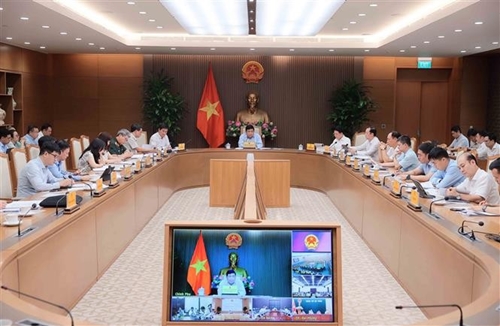The Deputy PM applauded the task force’s preparation, stressing that smart urban development is not a choice but an inevitable trend for countries aiming for sustainable growth, improving the quality of life for people, and strengthening urban governance and operation.
    |
 |
|
Deputy Prime Minister Nguyen Chi Dung chairs the first meeting of the inter-agency task force for coordinating smart city construction and development in Hanoi on July 16. |
If developed effectively, the digital economy can significantly boost national growth, he noted, adding that with proper planning and the integration of IT and digital transformation, the urban economy can also become a strong driver of economic development.
According to the deputy PM, the formation of the inter-agency task force is timely and crucial, serving as a central coordinator to advance institutional development, resolve arising challenges, and assist localities, especially the six centrally-run cities, in implementing pilot smart urban projects.
He assigned the Ministry of Construction to lead and coordinate with the Ministry of Science and Technology and other relevant ministries and agencies to draft a decree under fast-track procedures and submit it to the Government before August 15.
The meeting gave the go-ahead to the establishment of a task force responsible for coordinating and guiding eligible localities in implementing smart city development plans in line with the established roadmap. The task force will also supervise the implementation of relevant projects, and report to the Prime Minister on arising challenges, and propose solutions and policy improvements.
Delegates also reviewed a preliminary report on the implementation of Vietnam’s sustainable smart urban development project for 2018–2025, with a vision to 2030 (Project 950), and provided input on the Government’s draft decree on smart city development.
Ministries, agencies, and localities are required to develop their action plans based on assigned functions and responsibilities and submit them to the task force before July 25. They are also asked to thoroughly review the draft decree and send their feedback to the Ministry of Construction no later than July 20.
The Ministry of Construction is asked to coordinate with the Government Office to collect feedback on the draft decree, and conduct study tours to learn experience of countries with successful smart urban development. Regarding the review of Project 950, the Ministry of Construction is tasked with working with the Ministry of Science and Technology to prepare for the final evaluation by the end of this month.
The Deputy PM called for a clear roadmap to promote smart city-related industries, aiming to boost domestic production and reduce reliance on imports.
He proposed integrating digital transformation with smart city development by selecting several pilot communes or wards and establishing a clear investment roadmap to avoid a “scattered and overlapping” approach that could lead to waste, delays, and missed opportunities for localities.
He also highlighted the role of public-private partnerships in smart urban development.
Source: VNA